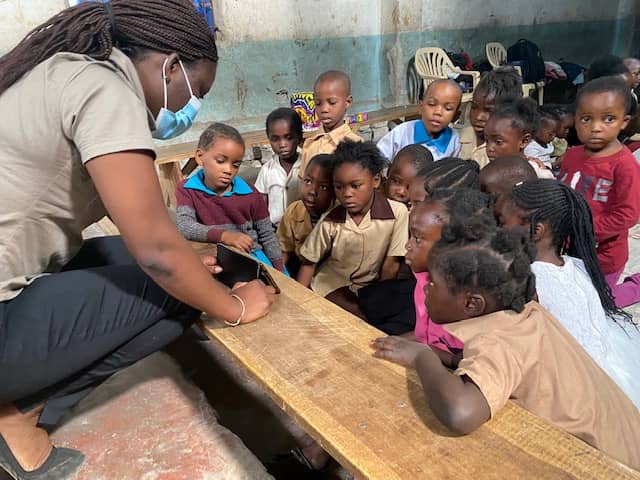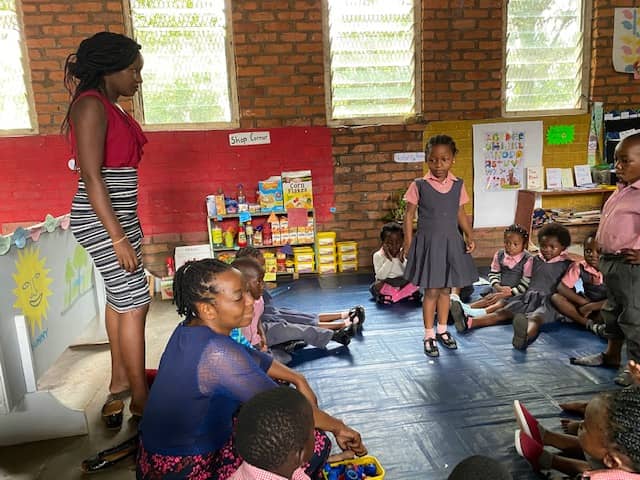The population of many African countries is doubling every eight years, with the continent forecast to account for over 40% of the global total by the end of the decade.
Statistics show that a girl in Africa who can read has two children, whereas a girl who can’t has five, meaning education will play a big part in addressing this demographic burden on the continent.

Perivoli Schools Trust was founded in 2012 as an affordable and scalable model to address this very issue. By showing teachers how to make educational activities out of recyclable materials, the organisation gives them and their pupils the tools needed to improve their futures.
So far, the Trust has interacted with over 12,000 teachers with a target of reaching 200,000 over the coming ten years. The model is currently active in Namibia, Malawi and Zambia and is launching in Uganda and Botswana later this year. The Trust also has its sights set on Tanzania, Burundi, Zimbabwe, Angola and Mozambique in the coming years.

Africa.com caught up with recently appointed CEO, Maya Kafuwa, who joined the organisation as its first trainer in Malawi in 2017. She was appointed as co-CEO with her husband, Titan Madomba, of the whole programme and she now oversees a team of 175 trainers across five countries. Here’s what she had to say.
How did you first get into this field of work?
“My career actually started in business management. I completed a Bachelor of Business Administration at the University of Eastern Africa-Baraton and went straight into two internships as an administrative officer.
“Funnily enough, when Perivoli Schools Trust first offered me a volunteer post, I had already been offered another job as an operations manager – but I turned it down to become a Perivoli Trainer.”
Why is being part of this charity important to you?
“There are a lot of reasons why this organisation means so much to me. But above all it’s the passion for education, helping children and creating a better future.
“Perivoli gives me a golden opportunity to shape the future of Africa through education. It’s so satisfying to see children learn better and hope for a bright future.
“For me it is not just work, or meeting the agreed targets, but more the satisfaction I get every evening when I go to bed that I contributed to make life for African children better. I helped to secure their future and I made a few hundred be able to smile.”
How does Perivoli Schools Trust work?
“We have created a unique training programme which gives African nursery school teachers the tools to be able to teach with few resources and little funding. Our Perivoli trainers show teachers how to make educational activities and games out of recyclable waste materials as they tend to have little money or training themselves. The model ultimately gives more children access to the education they so want and deserve, at no costs to the nursery school teachers.
“By focussing on nursery school children, we believe we can make a real difference, encouraging them to be creative from an early age, reducing dropout rates in primary and secondary school and ultimately giving them the tools for self-empowerment.
“The program is a completely scalable, affordable and transforming way of addressing the needs of nursery school teachers and children alike in Sub-Saharan Africa, both much overlooked constituencies.”
How does the charity support women and girls?
“Unfortunately, it’s well known that girls who can read have two children, and those who don’t have five. They tend to fall pregnant once they reach puberty at 13 or 14 if they struggle at school.
“Early Childhood Development (ECD) receives very little attention in Africa due to a lack of resources and funding. With our method, and by training more teachers, more African girls also have access to education, reducing the demographic burden and increasing the prospects for Africa’s female population.
“More than 11,500 teachers have received free training, working with more than 250,000 young boys and girls. We are targeting 200,000 more teachers across nine countries in the next 10 years – and 5 million children.”
What’s your aim for the trust, now you are in charge?
“My main aim is reaching out to more disadvantaged children whose parents cannot afford the high fees most private schools charge. Even the teachers who are trying their best to teach children and impart essential skills for development can’t reach those most in need.
“I want us to take education to the places it’s needed the most, which are also the places it never gets to be taken to.”
What’s the most stand-out moment of your time as CEO?
“I have uplifting moments on a daily basis when I’m with teachers in their classrooms as they thank me often for our help in making their lives so much easier.
“It’s also so amazing to see the difference in children’s expressions over the course of our time with them. When I first visit a classroom, I often see a room full of children doing nothing with sad glazed expressions – but now they don’t even look up to see who’s come in. They’re so busy doing activities, like playing with a toy shop or heading off to the puzzle corner, they don’t even look up.
“These experiences help me see that we are making a great difference.”
What advice would you share with other ambitious women?
“There is time for everything. While it’s important to go to school and learn essential skills, hard work and passion fuel your journey. Set challenging goals and make sure you achieve them – giving up is not an option. But above all you must be honest, have integrity and respect for yourself and others.
“Give to those who need what you have, more than you do.”











